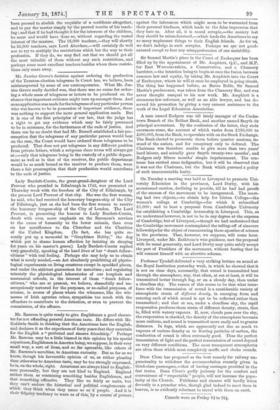Professor Tyndall delivered a very striking lecture on sound at
the Royal Institution yesterday week, in which he showed that it is not on clear days, necessarily, that sound is transmitted best through the atmosphere, nay, that often, at sea at least, it will be transmitted better through fog, or on a cloudy day, than under a cloudless sky. The reason of this seems to be that what inter- feres with the transmission of sound is a considerable variety of atmospheric strata of different density, in emerging from, and entering each of which sound is apt to be reflected rather than transmitted ; and that at sea, under a cloudless sky, the rapid evaporation produces these strata of different density, strata, that is, filled with watery vapours. If, now, clouds pass over the sky, the evaporation is checked, the density of the atmosphere becomes more uniform, and sound is transmitted more easily and to greater distances. In fogs, which are apparently not due so much to vapours of various density as to floating particles of carbon, the conduction of sound is often extremely good. Thus the perfect transmission of light and the perfect transmission of sound depend on very different conditions. The most transparent atmospheres are often those which most completely muffle and choke sounds.


































 Previous page
Previous page